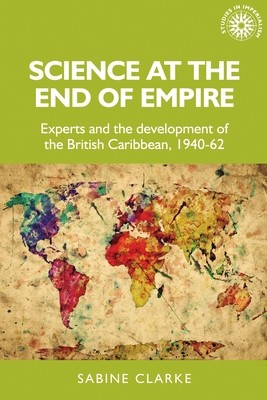
- We will send in 10–14 business days.
- Author: Sabine Clarke
- Publisher: Manchester University Press
- ISBN-10: 1526131382
- ISBN-13: 9781526131386
- Format: 15.6 x 23.4 x 1.6 cm, hardcover
- Language: English
- SAVE -10% with code: EXTRA
Reviews
Description
This is the first exploration of Britain's plans for industrial development in its Caribbean colonies. Historians have often denied that Britain ever had such hopes, but this book shows that, following revelations of serious deprivation during the 1930s, the Colonial Office launched a scheme to revitalise the region by using cane sugar as the raw material for making fuels, plastics and drugs. This volume shows the practical and political importance of scientific research and expert advice for the creation and implementation of Britain's colonial development plans after 1940.
Laboratory research into finding industrial uses for sugar offered a means for the Colonial Office to intervene in the development of the Caribbean with minimal disturbance to market forces. Once knowledge had been produced, decisions about the commercial production of sugar-based compounds could be left to business. This vision of industrial development rejected state planning and control, and was far more liberal in character than the large, rational and highly regimented schemes that were often promoted for colonial Africa.
Colonial Office attempts to persuade the colonies to take up its preferred route to industrialisation were made difficult however, by the growing autonomy of Caribbean governments as they approached independence. Additionally, American experts attached to the Caribbean Commission offered an alternative model of industrial development, based on the work of Puerto Rico's development corporation. This book illustrates the competition between Britain and America to shape the future of the Caribbean region, in which the provision of information and expert advice assumed a crucial role. It brings to light forgotten ideas of sugar as an industrial raw material, and shows the importance of science in the colonies in the post-war period.
EXTRA 10 % discount with code: EXTRA
The promotion ends in 13d.23:30:10
The discount code is valid when purchasing from 10 €. Discounts do not stack.
- Author: Sabine Clarke
- Publisher: Manchester University Press
- ISBN-10: 1526131382
- ISBN-13: 9781526131386
- Format: 15.6 x 23.4 x 1.6 cm, hardcover
- Language: English English
This is the first exploration of Britain's plans for industrial development in its Caribbean colonies. Historians have often denied that Britain ever had such hopes, but this book shows that, following revelations of serious deprivation during the 1930s, the Colonial Office launched a scheme to revitalise the region by using cane sugar as the raw material for making fuels, plastics and drugs. This volume shows the practical and political importance of scientific research and expert advice for the creation and implementation of Britain's colonial development plans after 1940.
Laboratory research into finding industrial uses for sugar offered a means for the Colonial Office to intervene in the development of the Caribbean with minimal disturbance to market forces. Once knowledge had been produced, decisions about the commercial production of sugar-based compounds could be left to business. This vision of industrial development rejected state planning and control, and was far more liberal in character than the large, rational and highly regimented schemes that were often promoted for colonial Africa.
Colonial Office attempts to persuade the colonies to take up its preferred route to industrialisation were made difficult however, by the growing autonomy of Caribbean governments as they approached independence. Additionally, American experts attached to the Caribbean Commission offered an alternative model of industrial development, based on the work of Puerto Rico's development corporation. This book illustrates the competition between Britain and America to shape the future of the Caribbean region, in which the provision of information and expert advice assumed a crucial role. It brings to light forgotten ideas of sugar as an industrial raw material, and shows the importance of science in the colonies in the post-war period.


Reviews